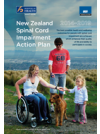The Action Plan outlines a vision, purpose, priorities and eight overarching objectives to help ensure the best possible health and wellbeing outcomes for people with spinal cord impairment (SCI), enhancing their quality of life and ability to participate in society.
Each year there are around 130 to 180 people diagnosed with SCI in New Zealand, with 80 to 130 receiving specialist acute SCI services in both ACC and health settings. There are currently around 1500 people with SCI resulting from an injury that are managed by ACC and less than 1000 people with a medical or congenital diagnosis of SCI who may be receiving supports from Disability Support Services.
SCI affects the lives of those who are diagnosed with it, but also many others, especially their families and whānau. It can happen at any age and, due to medical advancements, most people living with SCI now have a near normal life expectancy, but this brings with it progressive complexity for people and their lifelong self-management.
In March 2012, ACC and the Ministry of Health jointly led a project to review New Zealand’s SCI services and develop a national implementation plan for improving them.
ACC and the Ministry of Health worked collaboratively with a wide range of stakeholders, including clinicians, management, community representatives and people with SCI across the service continuum to develop the SCI Action Plan. A high level of engagement and support was received through the process.
Purpose
The overarching purpose of this Action Plan is to support people with SCI by:
- maximising opportunities for optimal improvements and maintenance of function
- reducing risks of complications and physical and mental wellbeing deterioration in the short and long term
- enabling independence and community participation
- supporting family, whānau, carers and employers who help people with SCI.

